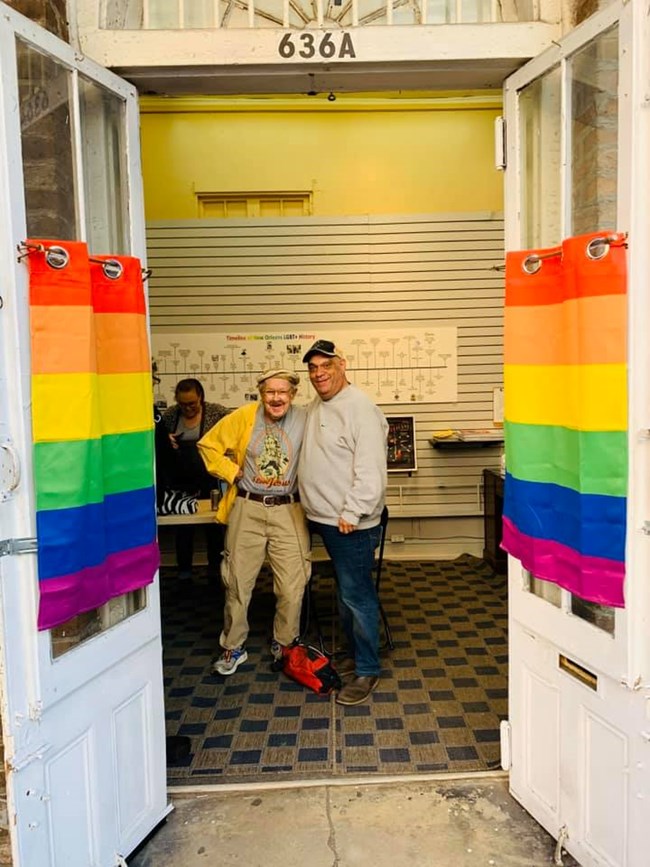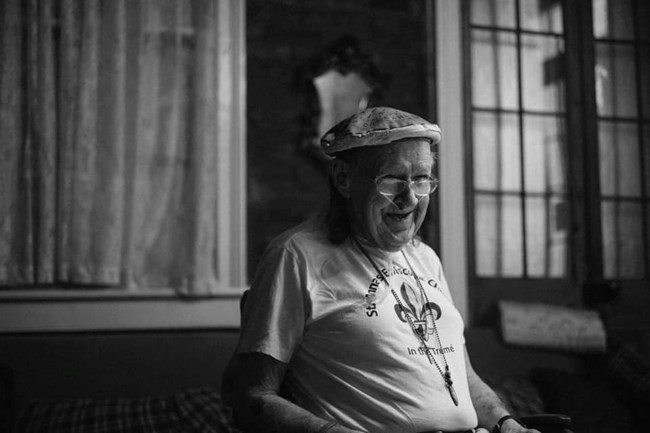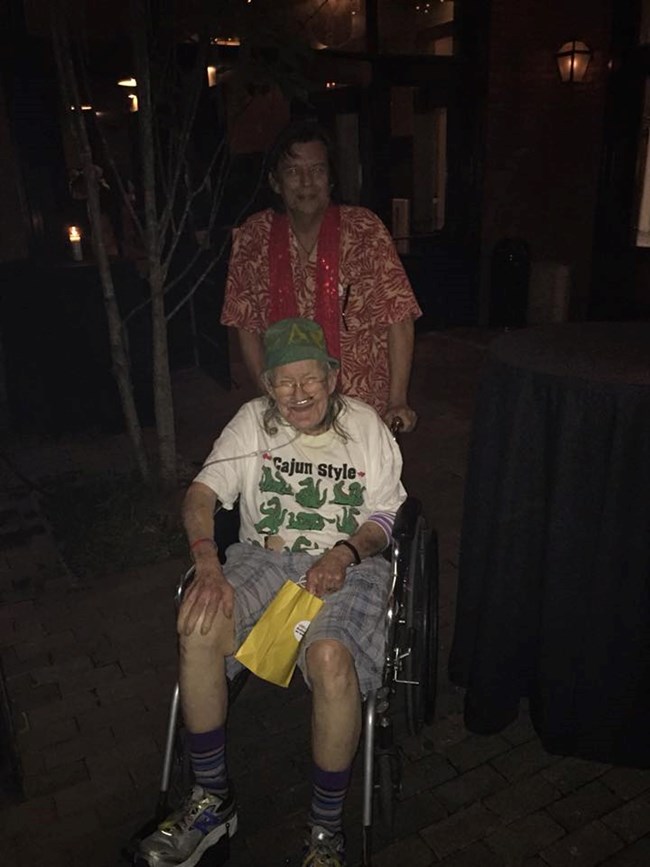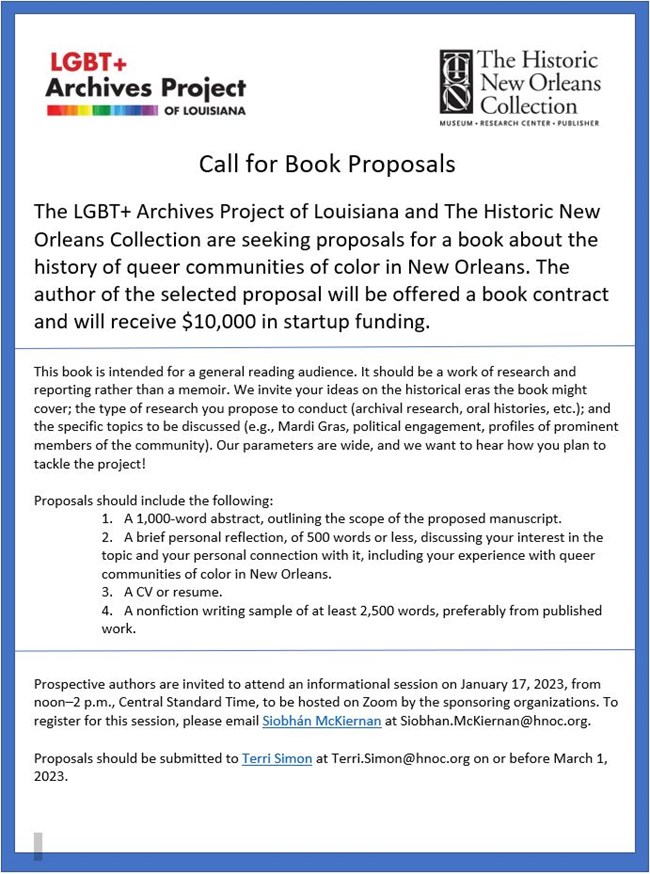Last updated: July 20, 2023
Article
Podcast 122: Stewart Butler's Legacy of LGBT+ Activism
Catherine Cooper: Hi, my name's Catherine Cooper. I am here with...
Frank Perez: Frank Perez, the author of Political Animal: The Life and Times of Stewart Butler.
Frank Perez: Frank Perez, the author of Political Animal: The Life and Times of Stewart Butler.
Becoming Stewart's Biographer

Image courtesy of the LGBT+ Archives Project of Louisiana
Frank Perez: The very short answer is he asked me to do it and I said yes.
The more complicated answer is that I first met Stewart when I was researching my first book, and he was very gracious with his time and very knowledgeable and helpful. In addition to that, he and I just hit it off on a personal note and became friends. And I got to know Stewart really, really well when he and I and a few other people co-founded a non-profit organization called the LGBT+ Archives Project of Louisiana. And we would have our board meetings at his home, which is known as the Faerie Playhouse. It was the site of many, many organizational meetings for the queer community in New Orleans in the late 20th and early 21st century.
And Stewart, when he read my first book, he called and made an appointment with me. We hadn't really become that close yet at that point. And this really is what kind of cemented our friendship. He called me over to the Faerie Playhouse, and I got the sense that I was going to the principal's office because he took out a yellow pad and just went through all the things that he thought could have been done better or more completely, or little errors he felt that were in the book. And I thought, dear God, this man hated this book, but he didn't. He wanted to let me know what I had missed. And it was a little strange at first. I've since then learned that he does that often with people. He used to do that with his pastor. He would criticize the sermons. It's just what Stewart did. And he didn't do it in a mean-spirited way, he was just curmudgeonly that way. And at the end of that critique, he countered it, balanced it, I guess you'd say, with a lot of affirmation and love. And then I realized, okay, I can handle this.
And he didn't ask me to write his biography immediately. We got to know each other. And in the meantime, I had worked on a few other books. I published, I don't know, five or six. And somewhere in the course of all those books, he realized maybe he does know what he's doing. And he had mentioned to me that some years ago he had secured someone else to write his and Alfred's story. And that did not pan out, but that he still was interested in having that done. And I say, "Well, you've led a fascinating life. I would be more than happy to do that. I do have some other works in progress. But once I complete those, I'll be happy to tackle this." And he said okay.
And that is how I came to be Stewart’s biographer.
Difference Between Writing a History and a Biography

Image courtesy of the LGBT+ Archives Project of Louisiana
Alfred was his soulmate, and he loved Alfred very, very much. And you couldn't talk to Stewart about anything without Alfred being a part of that conversation, even years after Alfred had passed. And so, fortunately, Stewart had friendly relations and was on good terms with Alfred's remaining family, who he put me in touch with. And they were very helpful as well. And then Stewart kept every paper ever associated with his life, and that goes for Alfred as well, so that made it a little bit easier. But I did have to do some independent research on Alfred and the Doolittle family. But Alfred's sister and his niece were very, very helpful.
Stewart saved everything. I mean, really a biographers dream. He kept every letter he had ever received, seems like, anyway. He would often keep copies of letters he sent to people or ask them to return the letters back to him. And he had a big trunk and a couple of other boxes filled with just personal correspondence.
He had terrible handwriting, I can tell you that. But those letters, thousands of them. And I spent about 18 months just reading all those letters and taking notes. And probably over half the notes that I took, I did not need. The hard part was creating just an index for myself to know where to go to kind of organize everything. But the letters were very valuable because those were his thoughts at the time that they were written. And they were very, very insightful into his life and his thinking and his attitudes and his emotions. He struggled with depression, which he writes about and whatnot. So the personal letters alone were overwhelming, but the personal letters paled in comparison to his personal papers. And by personal papers, I mean papers from every organization he was ever a part of. And he was a part of a lot of organizations, just about every major queer organization in New Orleans from the 1970s on.
And by papers, I mean agendas from board meetings, minutes from board meetings, personal notes, membership rosters, internal organizational memoranda, you name it. He just kept everything. He also kept a calendar. This is before the internet, which Stewart never embraced even though he was alive when it was out. He kept a handheld folding calendar for every year. And I was able to go through, I guess maybe 25 or 30 years worth of those. So that helped clarify questions I had in terms of dates and places and times. And he wasn't just meeting with so-and-so, he would make notes. He was a very big note taker, which was, like I said, a biographer's dream. So the hardest part was just going through all that material and getting a sense of what was there, and then going back and culling through the notes I had taken and re-looking at this and re-looking at that.
And to me, it just boiled down to, does it advance the story I'm trying to tell, or does it bog it down? And I think I'm a pretty good self-editor, but I'm not perfect. So when I finally sent the manuscript in to the publisher, they had other thoughts about some things I included, so I had to cut and chop. So it was just really a matter of, is this really necessary? Does this add to an understanding of Stewart and his work? So that was the question I used, the internal metric, if you will.
A Myriad of Stories
Unfortunately, there were a lot of great stories that really didn't make the book. There was a correspondence exchange between Stewart and a friend, this would've been back in the seventies, about how to make homemade poppers. And for your viewers or listeners who may not know what poppers are, in the 1970s and eighties, poppers were basically amyl nitrate that you would break a little vial and sniff it, and it kind of gave you a head rush and a little high. And it was very popular during sexual activity. It enhanced the experience, I can say it in a G-rated way. And they still have them today, but they're different today. They're called record cleaners now; you just uncap it, smell it. But they were different back then, and it was like you had to know a little bit of chemistry to make them. And so there was this hilarious exchange of letters between Stewart and a friend of his. And the friend is sending a recipe and instructions on how to make poppers. And there are all these interesting little arrows and footnotes. Don't do this or it will explode, or there's a chance that this will happen. I mean, it was just hilarious. And there were a lot of letters that spoke to his sexual exploits, which I didn't really feel were relevant to the book, although I tried to include a few. And the publisher kind of ixnayed that. But yeah, I would say most of the more salacious material involving his sex and drug use. He was no saint.
Stewart's Legacy

Image courtesy of the LGBT+ Archives Project of Louisiana
And I think it's a great example, and hopefully an inspiration, to just regular people to make the most of what they have and what they can do, so there's that. I also hope that the book inspires other researchers to dig deeper, because one of the things that frustrates me as a historian of queer New Orleans is the fact that no one knows anything about it. It's only in the last several years that people started writing and researching about New Orleans' LGBTQ+ history, and there's a lot more that needs to be done. So I hope people realize that, A, there is a lot of history here. And B, keep digging. So those would be the two main things, I suppose.
Need for More Research and Sharing of LGBT+ History

Courtesy of the LGBT+ Archives Project of Louisiana
I will also say that I think there needs to be a book written on the lesbian history of New Orleans, because every book that's been written so far are written by cisgender, gay men. And I think a lesbian voice is important and necessary, but also a work or a book that focuses on lesbian history. Now, there is a book on second wave feminism written by Janet Allured, who kind of touches on the fact that many of the feminists in the seventies in New Orleans at least were lesbians, but the focus is not lesbian history, so I think that's one.
Unfortunately, much of our trans history is still in the closet, and I think that needs to be excavated. I mean, I could go on, but those would be the two or three big ones, I would say.
I've written the book on the history of Café Lafitte in Exile, but there are a lot of other bars that could use books too. Bar history played such a crucial role in queer history everywhere because it was the only place you could go to find like-minded people for a long time. And in New Orleans, we were a drinking town. We had so many. And just a book tracing the evolution of these bars and these spaces and when they were sold and what they became and the new names and what their owners were like and so forth. I mean, I think that would be a fascinating book. That could be a whole volume of books.
The Importance of History
I would just like to remind people that it's very, very important to get our history out of the closet. And so I'm glad that people are reading the book. I hope they enjoy it. Even if they don't, it's okay because if we don't remember our history, we're doomed to repeat it. The events of the last several months, I think, really raise a red flag about the fact that all these hard fought rights that we won can easily be lost. And we need to be very vigilant about that. And I think a knowledge of our history will go a long way into inspiring people.
October is national LGBT History Month. And at the end of September, I met with city council member JP Morrell here in New Orleans. And I said, "LGBT history month is coming up in October. And the last time I testified before the city council, it was obvious that some of your colleagues were completely ignorant of some major events that affected the queer community in New Orleans. And I think you all need to come take my queer history tour in the French Quarter." He agreed to do that, but then he said, "Why don't you come and testify again before the council about New Orleans' queer history?" And I was happy to do that. I only had about 20 minutes, so I had to focus on something very specific. And what I chose to focus on was how horrible and homophobic the city was in the 1950s through the 80s, and cited specific examples and so forth. And all their jaws hit the desktops. I mean, they had no idea how horrible the city was. And a lot of people are like that because today New Orleans is so tolerant and it has this reputation of anything goes, but it wasn't always like that, for us anyway. So I would just encourage people to familiarize themselves with history and to support the LGBT+ Archives Project of Louisiana, which they can do at lgbtarchiveslouisiana.org.
Catherine Cooper: Thank you so much, Frank.
Frank Perez: You're very welcome.
October is national LGBT History Month. And at the end of September, I met with city council member JP Morrell here in New Orleans. And I said, "LGBT history month is coming up in October. And the last time I testified before the city council, it was obvious that some of your colleagues were completely ignorant of some major events that affected the queer community in New Orleans. And I think you all need to come take my queer history tour in the French Quarter." He agreed to do that, but then he said, "Why don't you come and testify again before the council about New Orleans' queer history?" And I was happy to do that. I only had about 20 minutes, so I had to focus on something very specific. And what I chose to focus on was how horrible and homophobic the city was in the 1950s through the 80s, and cited specific examples and so forth. And all their jaws hit the desktops. I mean, they had no idea how horrible the city was. And a lot of people are like that because today New Orleans is so tolerant and it has this reputation of anything goes, but it wasn't always like that, for us anyway. So I would just encourage people to familiarize themselves with history and to support the LGBT+ Archives Project of Louisiana, which they can do at lgbtarchiveslouisiana.org.
Catherine Cooper: Thank you so much, Frank.
Frank Perez: You're very welcome.
Read other Preservation Technology Podcast articles or learn more about the National Center for Preservation Technology and Training.
